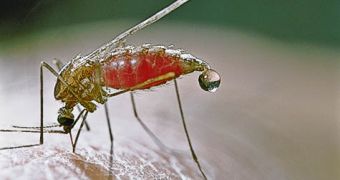Chimps gave as the HIV virus, but now they could compensate with another one that may cure malaria. This virus triggers cold and stomach trouble in chimps, but it is harmless for humans.
Trials made at the Oxford University found an antimalaria boost of the human immune system caused by this virus in 100% of the cases. Previous tests with the virus had showed only a 40% effectiveness.
Malaria is found in 500 million people (!) and is caused by a protozoa spread by the female of the Anopheles mosquito. 300 million of these cases are severe. In the east African villages, children are bitten by the Anopheles mosquitoes carrying malaria 50-80 times a month. It triggers fever, shivering, abundant sweating, articulation pains, severe headache, vomit and extreme weakness, so the diseased cannot even cry.
Each year, 1.5 million people die of malaria (one million in Africa South of Sahara), a child every 30 seconds. About 120 million people have died of malaria since 1914, and the disease is endemic in 101 countries, mainly tropical, in Africa, Asia and America. People in developed countries are not safe either: 2,000 Britons catch it annually during holidays in exotic places and around 10 die of malaria.
Antimalaria vaccine must solve an issue: the protozoan remains much of its life hidden inside the liver - where most vaccine anti-bodies cannot act. The vaccine based on the chimp virus spurs the immune killer T cells, which enter the liver. The vaccine is made of a mild strain of the chimp virus combined with some malaria genes.
"We're very excited by the results. If the vaccine works really well and is used in combination with drugs and methods like bed nets, malaria could be eradicated," said co-author Dr. Sarah Gilbert.
The 32 subjects displayed few side-effects caused by the vaccine. In the following large trials, subjects will be infected with malaria to see how effective the vaccine really is. This vaccine could be combined with a second type attacking the parasite after it goes from the liver to the bloodstream, where it rapidly booms, triggering the malaria attacks.
Some already project the technique for other infections, such as TB or HIV.
"Even if the vaccine is not completely effective it could cut the severity of illness. But malaria is more complex than any illness already controlled by vaccination, and eradication could take up to 40 years," said Dr. Colin Sutherland, a malaria expert from the London School of Hygiene and Tropical Medicine.

 14 DAY TRIAL //
14 DAY TRIAL //